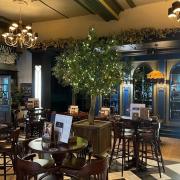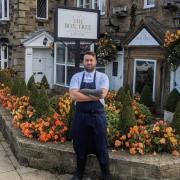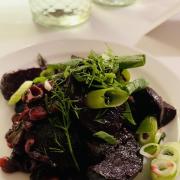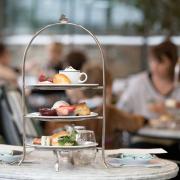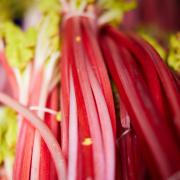The shopping list of artisan produce available in Malton just grows and grows. Words by Jo Haywood. Photographs by Andy Bulmer

When Malton announced its aim to become ‘Yorkshire’s food capital’, some people scoffed and dismissed the ambitious notion as pie in the sky. But it’s happening.
With its range of independent shops, food markets, Malton Cookery School, the growing community of artisan producers trading under the Made In Malton name and the renewed success of the revamped Talbot Hotel, even the most negative naysayers are now eating their words.
Talbot Yard, just across the road from the Talbot Hotel and part of the same 300-year-old Fitzwilliam Estate owned by the Naylor-Leylands, is another key ingredient in Malton’s recipe for success. It’s a cluster of six restored and refurbished units, launched by Fitzwilliam heir Tom Naylor-Leyland as ‘an incubator for up-and-coming food entrepreneurs’.
Among the businesses already taking advantage of this fascinating foodie hub are Bluebird Bakery, Groovy Moo Ice Cream, Aldo’s Fresh Pasta, Food to Remember and Roost Coffee & Roastery.

The latter is run by husband and wife team David and Ruth Elkington, helpfully aided (sort of) by their young daughters Erin and Betsy. Originally from Lincolnshire, they swapped careers in youth work and textile design to open Cotton House coffee shop in Helmsley five years ago.
It proved a great success with customers who loved its shabby chic atmosphere and quality fare, but it wasn’t quite the business of their dreams.
‘My passion has always been coffee,’ said David. ‘So I started studying the roasting process – I love a bit of research. I soon realised that this was me; this was what I wanted to do. I didn’t just want to splash hot water into a pot, I wanted to source and roast my own coffee.’
Happenstance brought the Fitzwilliam estate manager to their door at just the right moment, offering them a purpose-built, dual production-retail space in Talbot Yard.
‘It was still pretty much falling down at the time but, because we came on-board so early, we were able to make the building fit our business rather than the other way round,’ David explained.
You only have to spend five minutes in Roost to see how well the building and business fit together. Ruth and David favour a pared-back, industrial look that makes the most of the production heritage of the yard. It also means their industrial roaster – a beautiful black and silver beast by Diedrich – doesn’t look out of place in the heart of the espresso bar. In fact, it looks rather splendid.
Roost is primarily a wholesale brand, selling batches of freshly roasted espresso, single origin and Swiss Water decaf to restaurants, coffee bars, delis and shops. But retail customers can also pop in for a bag of their favourite brew too.
‘We feel it’s important to teach people about coffee, whether we’re selling retail or wholesale,’ said David. ‘It’s important people know where it comes from and how it’s made, especially if they’re baristas who really want to know about the business they’re in.’
Complete transparency is at the heart of the Roost ethos. They don’t want to roast their coffee on a closed industrial unit in the middle of nowhere; they want people to see what they do, appreciate the care that goes into the process and reap the taste rewards of coffee freshly roasted every week.
David has meticulously developed his own recipes for the perfect espresso blends and, through a painstaking process of trial and error, learned how to read the beans imported from around the world so each is roasted for just the right time at just the right temperature.
‘It’s not a difficult process,’ he said. ‘But there are lots of stages where something can go wrong. And once something has gone wrong, there’s no saving the batch.’
He will have no truck with tea, not even since moving to Yorkshire where we make the most glorious cups of tea known to man (it’s a fact, don’t try to argue otherwise).
‘I don’t understand why you’d want to drink something that tastes like dirty dish-water,’ he said.
But he’s definitely been won over by the Yorkshire gumption and ambition shown by the people of Malton in their quest for ‘food capital’ status.
‘Without the food festival and the push towards making Malton the food capital of Yorkshire, we wouldn’t have moved our business here,’ he said. ‘Having the support of the festival and the Made In Malton brand was a clincher. ‘
The smaller Talbot Yard community has also proved crucial to Roost’s continuing rise.
‘Working with the other people around us makes us a better business,’ said Ruth. ‘We’ve got a good relationship with our neighbours in the food court and a growing rapport with others across town. It just makes sense for us to work together, so we can cross-promote and raise the profile of the whole place.’
Creating and maintaining a successful business is never easy, but it’s child’s play when compared to the agonies of making a proper cup of coffee at home without the help of a qualified barista. So, we have to ask: when do we plunge?
‘Four minutes and stir; four minutes and plunge,’ said David.
Although, if you’re an espresso fan, he would strongly advise investing in a top of the range machine.
‘If people are truly serious about making espresso at home, then the little £90 machines are not going to cut it,’ he said. ‘If people ask my advice, I say “start saving” because, for a quality machine, you’ll be looking at something like £1,200.’
Or you could just nip round to Roost and get Ruth and David to do it for you. They are the experts after all.






